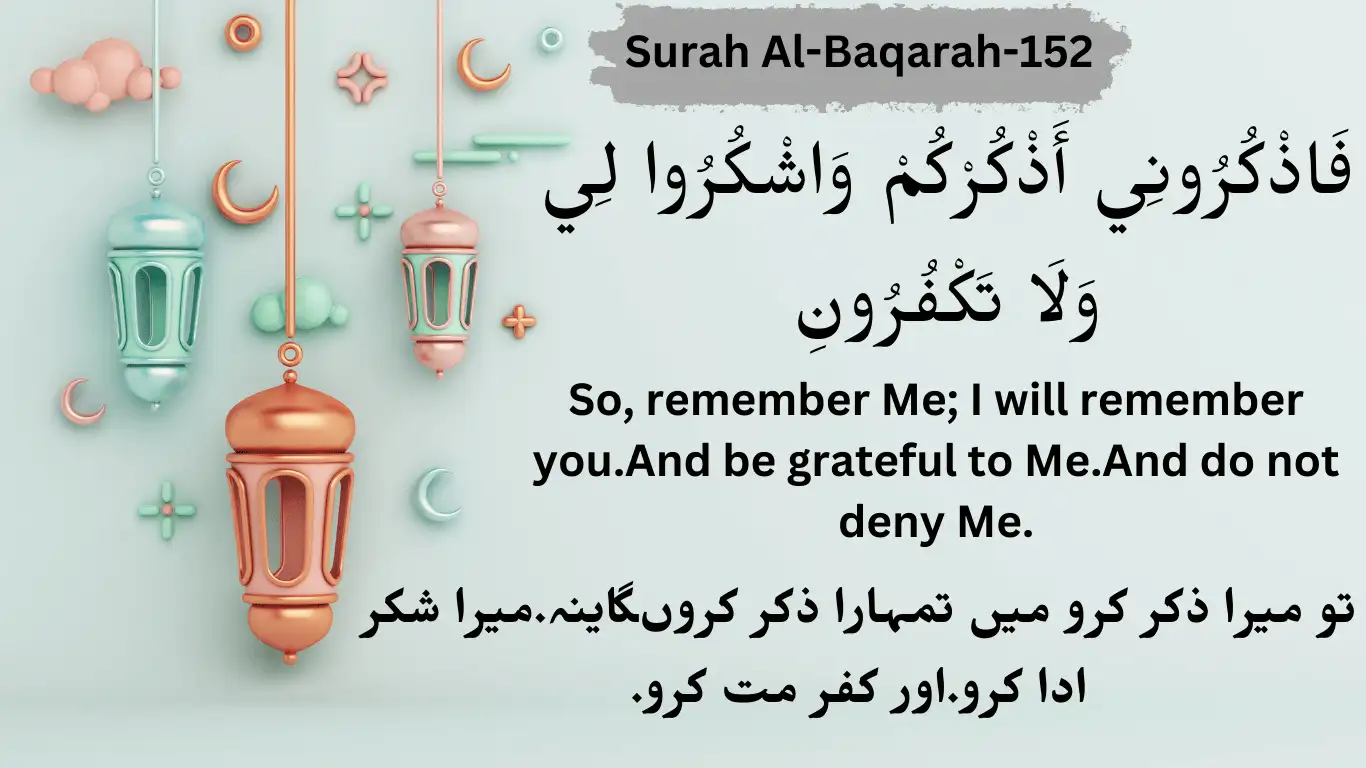Introduction
The Quran provides timeless guidance that resonates deeply with believers. One such profound verse is from Surah Al-Baqarah:
فاذكروني اذكركم واشكروا لي ولا تكفرون
Translation: So remember Me; I will remember you. And be grateful to Me and do not deny Me.(Surah Al-Baqarah, 2:152)
This verse carries an important message from Allah, emphasizing the mutual connection between the Creator and His servants. Let’s explore its significance and lessons, one aspect at a time.
| Surah Ikhlas (Chapter 112) Allahu Samad |
| Dua Rabbana La Tuzigh Quloobana- Surah Imran |
| La Yukallifullahu Nafsan Illa Wus’aha- Al-Baqarah |
| Hadith- Allahumma Inni As’aluka Al Jannah |
Fazkuruni Azkurkum: Remembering Allah
Arabic Verse
فاذكروني اذكركم
Urdu Translation
تو میرا ذکر کرو میں تمہارا ذکر کروںگاینہ
English Translation
“So, remember Me; I will remember you.”
The phrase “Fazkuruni Azkurkum” highlights the mutual bond between Allah and His servants. When believers engage in the remembrance of Allah through prayers, supplications, and righteous deeds, they draw closer to Him. This divine promise assures believers that their devotion does not go unnoticed.
Key Reflections:
- Remembrance strengthens faith: Regularly mentioning Allah’s name nurtures spiritual consciousness.
- Allah’s response: When Allah “remembers” a believer, it signifies His mercy, blessings, and guidance.
The Act of Gratitude: Wa Ashkuroo Li
Arabic Verse
واشكروا لي
Urdu Translation
میرا شکر ادا کرو
English Translation
“And be grateful to Me.”
Gratitude towards Allah is a central theme in Islam. Expressing thankfulness is not limited to verbal acknowledgment but is also demonstrated through actions and attitudes.
Key Reflections:
- Shukr in daily life: Recognize Allah’s favors in everything, from health to sustenance.
- Benefits of gratitude: Gratitude invites more blessings, as highlighted in Surah Ibrahim (14:7): “If you are grateful, I will surely increase [My favor] upon you.”
Avoiding Ingratitude: Wa La Takfuroon
Arabic Verse
ولا تكفرون
Urdu Translation
اور کفر مت کرو
English Translation
“And do not deny Me.”
Ingratitude, or kufr, is the opposite of shukr. Allah warns against denying His favors, as it leads to spiritual downfall.
Key Reflections:
- Consequences of denial: Forgetting Allah’s blessings creates distance from Him.
- Path to repentance: Islam encourages turning back to Allah with sincerity whenever one falters.
Practical Ways to Implement This Verse
- Daily Dhikr: Set aside time for morning and evening remembrance of Allah.
- Gratitude Journaling: Reflect on three blessings each day and thank Allah for them.
- Avoid Negativity: Refrain from complaining and focus on Allah’s countless mercies.
- Community Service: Share Allah’s blessings by helping those in need.
Conclusion
Surah Al-Baqarah 2:152 is a powerful reminder of the reciprocal relationship between Allah and His servants. By remembering Allah, showing gratitude, and avoiding ingratitude, believers can strengthen their faith and attain divine mercy. This verse serves as a beacon of hope and guidance for all.
FAQs
It means, “So remember Me; I will remember you.” (Surah Al-Baqarah, 2:152). This highlights the importance of dhikr (remembrance of Allah) in strengthening one’s connection with the Creator.
Gratitude can be practiced by thanking Allah in prayers, acknowledging His blessings, and using His favors to benefit others.
Avoiding ingratitude helps maintain spiritual closeness to Allah and prevents arrogance. It fosters humility and a positive outlook on life.
Incorporating this verse into daily life allows believers to live with mindfulness, gratitude, and devotion. May Allah guide us all to embody the principles of Surah Al-Baqarah, 2:152.




